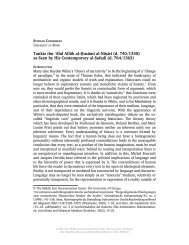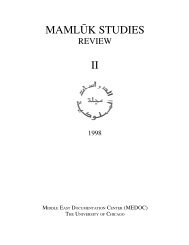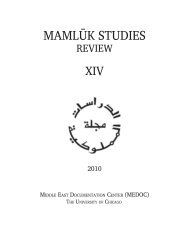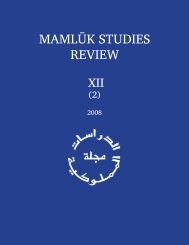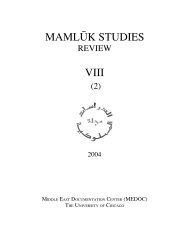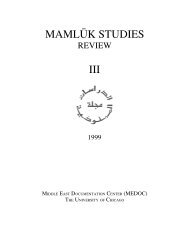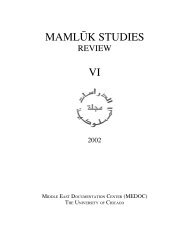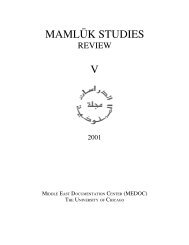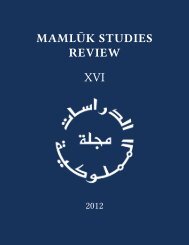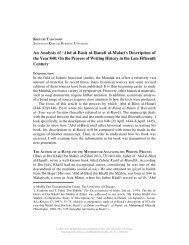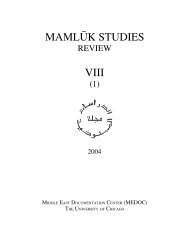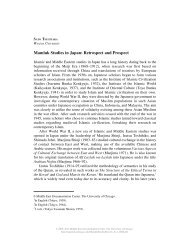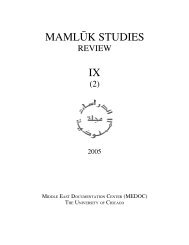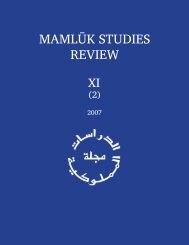Mamluk Studies Review Vol. IV (2000)
Mamluk Studies Review Vol. IV (2000)
Mamluk Studies Review Vol. IV (2000)
Create successful ePaper yourself
Turn your PDF publications into a flip-book with our unique Google optimized e-Paper software.
38 ROBERT IRWIN, UNDER WESTERN EYES<br />
historians working within and beyond the field—in shaping an image of hidebound<br />
chivalrous <strong>Mamluk</strong>s doomed by new technology. But it is not his best work and<br />
recent studies by Carl Petry and Shai Har-El have chipped away at some of<br />
Ayalon's arguments. Har-El, in particular, has taken a more positive view of the<br />
<strong>Mamluk</strong>s and their military response to the Ottomans. He argues that their main<br />
problem was lack of such resources as wood, iron, etc. Neither Petry nor Har-El<br />
seem to think that <strong>Mamluk</strong> defeat at the hands of the Ottomans was a foregone<br />
conclusion.<br />
Ayalon's "Aspects of the <strong>Mamluk</strong> Phenomenon," published in Der Islam in<br />
1977, stressed the essential continuity between the Ayyubid and <strong>Mamluk</strong> regimes,<br />
whereas the drift of R. S. Humpreys's "The Emergence of the <strong>Mamluk</strong> Army,"<br />
which appeared in Studia Islamica in the same year, was to argue for distinct<br />
changes—for reforms taking place early on in the reign of Baybars. Ayalon was<br />
to reply to Humphreys in an article in the Revue des études islamiques in 1981.<br />
The heart of their disagreement concerned the specific problem of the continuity<br />
of the h˛alqah in any but a merely verbal form. There was also the issue of the<br />
chronology of the establishment of a three-tier officer class. Ayalon's arguments<br />
for continuity were detailed and ingenious and it is certainly true that if, say,<br />
Baybars carried out a sweeping program of reform, there is little direct evidence<br />
for it. Even so, I believe that Humphreys has carried the day, particularly on the<br />
decline of the h˛alqah from an Ayyubid elite force to a poorly rewarded kind of<br />
auxiliary arm of the <strong>Mamluk</strong> army.<br />
In 1968 Ayalon published an article on "The Muslim City and the <strong>Mamluk</strong><br />
Military Aristocracy." Although it was published the year after Lapidus's Muslim<br />
Cities in the Later Middle Ages, Ayalon's article had presumably been in press too<br />
long to take account of Lapidus's arguments. Certainly its conclusions were very<br />
different from those of Lapidus (to which we shall come). Ayalon placed heavy<br />
emphasis on the alienness and social isolation of the mamluks. The mamluks,<br />
immured in the Citadel, were more or less immune from contaminating and<br />
weakening contact with Cairo's citizens. Only in one very striking way did they<br />
involve themselves in the life of the city and that was in the endowment of<br />
mosques, madrasahs and kha≠nqa≠hs. And here again Ayalon drew attention to Ibn<br />
Khaldu≠n's reflections on the matter. Ibn Khaldu≠n was inclined to see the buildings<br />
as the outcome of the amirs' desire to protect their wealth and to ensure its<br />
transmission to their descendants by creating waqfs. Having emphasized the isolation<br />
of the military from the civil, Ayalon did go on to note that Syria seemed to be<br />
different, but he left the matter there. He was never so interested in Syria as in<br />
Egypt, a bias which, to some extent, unbalances his presentation of the h˛alqah<br />
elsewhere. (While on the subject of the relative importance of Egypt and Syria,<br />
Garcin has argued, rightly I think, that whereas Syria was hardly more than<br />
© <strong>2000</strong>, 2012 Middle East Documentation Center, The University of Chicago.<br />
http://mamluk.uchicago.edu/<strong>Mamluk</strong><strong>Studies</strong><strong>Review</strong>_<strong>IV</strong>_<strong>2000</strong>.pdf



